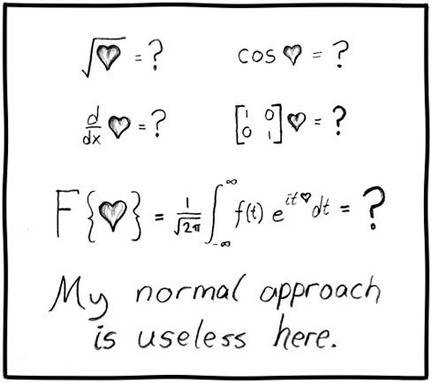 http://xkcd.com/55/ http://xkcd.com/55/ I've been considering the question of "What is the opposite of Love?" It's an important question, because so often we only see clearly by contrast. I want to know what about me is love, so I also want to know what about me is anti-love. I want to understand abuse and hurt, so I want to know about growth. The reality is that love's attitude and action have to go together, because love compels action. That is why to say "I love God" but not reveal that in your actions, gives lie to your statement. Most people I ask immediately say the opposite is hate. But that's an unthinking answer, and doesn't really work: God is love, but God also hates. So if God is love then love can properly hate. Many have said the opposite of love is indifference, or apathy. As George Bernard Shaw said "The worst sin toward our fellow creatures is not to hate them, but to be indifferent to them: that's the essence of inhumanity". But that says "the worst sin is indifference", the worst sin (if there is one) is not the opposite of love, it's an offense to love. Indifference is like the cold, or darkness. You can have a lot of heat, or a little heat, but there's no such thing as cold. Cold does not exist, its only a useful word for the absence of warmth. You can have a lot of light or a little light, but you can't have a lot of dark, only the absence of light. In the same way indifference is not the opposite of love, only the absence of love. If I stop loving, I am indifferent. Indifference is inaction, not an opposite. To find the opposite you have to go through nothing and come out the other side. To go from +1 to -1 I have to go through zero. Someone said the opposite of love is Satan (thinking perhaps of the statement "God is love"). But to say "God is love" is not the same as saying "love is God". So as love is personified in God, the opposite of love is personified in Satan. (Please note, I am not make a statement of dualism, I am not equating God and Satan. God is way more than Satan.) So what then is the opposite of love? I think we get trapped by the idea that the answer has to be binary, that if there is a +1 then there is also a -1. This is a problem of language. In English we have one word for love, the Greeks had 4, and I'm sure other languages have many subtleties to capture the sense of this thing called love. English as a language encourages seeing love through the lens of dualism. To even make the statement "there is an opposite of love" is to imply dualism. So at the very least we might be able to conclude there is no exact opposite of love. This also fits with our understanding that God is love. God created all, and so anything we might conclude to be the opposite of love can at most be a twisted distortion of what God made, arising from our use of free will. We can also conclude that the opposite of love must be exhibited in action, because the absence of something is not an opposite. Love is exhibited in action, with consequence. So we may conclude that the opposite will also have consequence through action. If we then accept that the opposite of love is not something singular, just as love is not one-dimensional, and, if we accept that like love any opposite also includes action leading to consequence, then how should we look at it? In one of my middle-of-the-night sleepless moments (do you have those too?) I started working through what I knew love is, and then considering the opposite to those characteristics. This also led to the thought that love is relational, so an opposite would break relationship. Then in the morning I saw two online comments in a forum where I raised this question, and which reinforced my thinking. One wise person pointed me to 1 Corinthians 13, which points to what love is. Another said the opposite was "selfishness", which points to the anti-relational nature. Well, there's lots of facetious "wisdom" on what love is: cartoons, along with mushy, sentimental, deep, silly, or even stupid statements, and lots of cynical comments. Instead lets go with the source that most people find indisputable (especially if evidenced by how much it is used in wedding services). Here we are, from 1 Corinthians 13, love is, and its opposite:
Love is reality: hard, unbending, true, and absolute. Else it could not be love. The opposite of love denies reality, it is a pretense that whats real is not true. It is flexible, pliable to suit the needs of the moment, relative. This does not mean the opposite of love has no consequence. To deny something is to try and kill it, to deny truth will have consequence (try deny gravity for a few hours). To be unloving to another can destroy them. My conclusion: The opposite of love exists only in our exercise of free will when we try to destroy love. Love is attitude in action. The opposite is the anti-attitude in action. Both have consequence: love establishes and affirms truth, reality, and relationship. The opposite seeks to replace truth with lies, reality with unreal fantasy, and relationship with individualism. After thoughts: In today's world we have so much denialism, relativism, and fantasy world views. Just look at the belief that capitalist exploitation is sustainable, climate change is not real, and values are self determined. Perhaps this shows just how little love we have.
* The term "things" as used here, should be read as "reality": those things which actually exist, like truth and gravity, as opposed to the things we only imagine to exist like our lies and pink elephants.
0 Comments
If you thoughtfully engage with a cross section of society about why they a) do or do not have a theistic outlook, and b) accept / reject Jesus (as opposed to institutional Christianity).
The rationale of many of these discussions is often based on an unthinking acceptance of assumptions, which when examined can disclose why someone's actions often tell a different story to their professed worldview. This paradox is not atypical of contemporary postmodern society where people are seemingly comfortable to hold contradicting views. Just as Christians are far from homogeneous in their belief ... often holding to the dogma with no reality to their faith ... so too do atheists also come in many flavors. To engage in discussion between members of different persuasion, it is helpful to be conscious of the diversity. This article has some interesting insights into the atheistic "groups" of people: HERE. The question was posed to me: "Apart from salvation, what can I expect God to do for me?" Sadly it's a question that many Christians would quickly pounce on and say "How can you ask that?", as if questioning God was not allowed. But God gave me a brain, and presumably I should use it (unlike some, Limbaugh comes to mind).
(This is not the question of what can I expect of God if I enter relationship with Him as damaged goods ... thats another story for another time) It was a question that made me pause, and I had to resist the temptation to trot out all the platitudes we so unthinkingly use. Then the cynic in me wanted to say "we can expect nothing" ... for on what grounds can we expect God to do anything. He's sovereign, and owes me nothing. But the more I thought about it, the more I came to the conclusion that's not exactly true. The balance is between understanding the expectations of relationship, and what I think he should do for me. Its a fine line we so easily confuse. Many relationships founder on this, when one partner begins to run the relationship by their individual requirements of the other. Here's my analogy (remember, analogies are finite): When I married, promises were exchanged. These were not promises of "I'll make sure you have a good job", "I'll prevent you from sickness", "I'll shield you from the evil of others", or "I'll be sure that you have a nice suburban house with big screen TV, iPad, and high speed internet". These promises are not made, because relationship can never grow if experience is not shared! No, the promises were that "I'll love you, stand by you, never leave you, forgive you, not harm you, walk with you, and share the struggles". God says the same things, with one exception. He also says follow me, and I promise these things. It sounds like conditional love, but its not. As humans we are so quick with our conditional love ... "I'll do this if you do that" .. and when the other person fails we withhold our favour (yet we are quick to complain when the situation is reversed). That's because human relationships are based on the equality of partners. So if God's promises are not conditional, what are they? God's statements of "Follow me and I'll ..." are objective statements of the reality of relationship with a God. He's saying that while we are in relationship, his promises hold and I can expect that. If I break the relationship, the relationship is just that - broken! It's not that God then fails to deliver, its that we have walked out the room (amazingly God's grace even then may prevail). So what can I expect of God? I can expect him to honour the promises of relationship. These are not promises of never being sick, never hurting, never knowing sadness, never suffering, never being hungry, never feeling lost, never having to make a decision for myself, never having to use my brain. Because part of growing in relationship is to take my share of responsibility. No, the promises are that God will be the strong partner, be a lover, share responsibility, collaborate (which in itself is amazing). And part of being in an unequal (healthy*) relationship is that the stronger partner desires to see the other grow. (Remember the limits to analogies?) It's like the master trusting the apprentice to do a job, even though the master has NO need for the apprentice, but does so because the apprentice will then become more than he is now. He does it for the apprentice. This is dangerous, because the apprentice is exposed to danger. The apprentice may hurt himself, may fail, may know misery, but those are the risks of learning. To learn and never try is to never learn. And every success is built on the lessons of trying. Through this the apprentice becomes more like the master, and more skilled, more able to complete the tasks, and enters into a deeper relationship of shared understanding with the master. The first time I could truly empathize with someone who had lost a parent was when I lost a parent. The first time I could really understand someone who has been hurt by another, was when I had been hurt by someone. When I failed at a task, I could help another who was struggling with the task. That is why I struggle to deeply empathize with someone in the gutter ... I feel sorry, I am moved, and may act in response, but the depth of my emotion is finite. Yet let me hear of someone being bullied, and my anger is roused because I know what it is like. So what can I expect from God? God by definition is the senior partner in our relationship ... he leads and he has a mission. He is the master and I am the apprentice working to serve the greater wisdom. He sees the completion, and knows the steps to reach it. I am the pupil who he amazingly entrusts with tasks towards that end goal ... entrusted while we are in our relationship. Like Frodo and Gandalf, who shared a commitment to a grand objective that was good, true, necessary, and important. Frodo was entrusted with tasks, and Gandalf walked with him into the tough situations. Sometimes he was alongside, sometimes Gandalf was far away and Frodo had to struggle seemingly on his own with the task entrusted to him. Yet all the time Gandalf is working on his behalf, often facing dangers and trials that Frodo could never handle. They are in relationship, and can expect all that one does of relationship. So with God I expect relationship. I expect to feel close, yet sometimes to feel apart but know he is working for us ... I expect at all times that we work to a common purpose. I expect to be stretched, I expect troubles, sadness, and hurt. But I expect joy of the union of purpose. Because of relationship. Take that away, and I can expect nothing except dismissal. * Note we can be in relationships of unequals that are not healthy. Most particularly we can submit to other authorities, spiritual and physical, that harm us. Think of drugs, spousal abuse, or the occult.  Not long ago I was having a conversation with a college student. Like many young adults, this guy was a religious "none." He wasn't some sort of jaded post-religious person, but he also wasn't actively trying to find a religious home. ... HERE  “How much public singing, even in the house of God, is of no account! How little of it is singing unto the Lord! Does not the conscience of full many among you bear witness that you sing a hymn because others are singing it? You go right straight through with it by a kind of mechanical action. You cannot pretend that you are singing unto the Lord. He is not in all your thoughts. Have you not been at places of worship where there is a trained choir evidently singing to the congregation? Tunes and tones are alike arranged for popular effect. There is an artistic appeal to human passions. Harmony is attended to; homage is neglected. That is not what God approves of. I recollect a criticism upon a certain minister’s prayers. It was reported, in the newspaper, that he uttered the finest prayer that had ever been offered to a Boston audience! I am afraid there is a good deal of vocal and instrumental music of the same species. It may be the finest praise ever offered to a congregation; but, surely, that is not what we come together for. If you want the sensual gratification of music’s melting, mystic lay, let me commend to you the concert-room, there you will get the enchanting ravishment; but when ye come to the house of God, let it be to ‘sing unto the Lord.’ As ye stand up to sing, there should be a fixed intent of the soul, a positive volition of the mind, an absolute determination of the heart, that all the flame which kindles in your breast, and all the melody that breaks from your tongue, and all the sacred swell of grateful song shall be unto the Lord, and unto the Lord alone.” From Spurgeon’s sermon: The New Song and the Old Story,  Preface: There is a wonderful concept on how important it is to feel stupid. If you have no sense of inadequacy then you are not being stretched. If you are not being stretched, you are not growing. If you are not growing, you have nothing new to say. If you have nothing new to say, you have nothing new to contribute. Caution: For the introspective recluse with limited interactions, this essay may suggest that you have to expand your circle of relations and become vulnerable. For the gregarious extrovert with extensive social circles, this post may suggest you narrow your circle of relations and become vulnerable. Question: Are you an apprentice, and a teacher, and a doer? These are essentials, especially for the Christian. Let me be offensive and suggest that many (most?) people in western cultures settle for adequacy in life -- a level at which their zone of comfort protects them enough from reality: I have my McDonalds / favorite organic new-age veggie salad (your preference), I take a vacation each year, I have a circle of friends, a job (for now), I manage to ignore the pain of my past, what more do I need? Many in the poorest developing nations similarly settle into a zone of discomfort because they've had all the ambition beaten out of them: I have a shack, a toilet, a government grant, the local shebeen, and a soccer field nearby, I have blinded myself to the pain of the future, what more do I need? And so we come to Disney's classic "The Sorcerers Apprentice", which carries some simple deep truths (as do so many fantasy tales). It's about the way we grow. There are three basic, parallel and lifelong ways we grow in skill, expertise, understanding, and insight -- three ways to learn. I am not thinking here of academia (although of course it applies), but thinking of the "me" - growing my body, mind, and spirit in a world that is, if nothing else, relational. 1. We become an apprentice, like a blacksmith apprentice who would live in the presence of the master, watching, hearing, and experiencing the essence of a blacksmith. Sadly, the formal apprenticeships of yesteryear are few and far between now. Today we've corrupted this to the production lines of university credits, or the plethora of self-help books on "3 ways to attract members of the opposite sex", and other such weighty topics. But really, there is plenty of opportunity to become apprentices. Court the company of those who are wise, for there I can hear what they say, see what they do, and discuss what they profess (as a university Professor once was ... someone who professes). This is where we really learn, in the presence of proficiency ... experiencing it first hand to learn a thousandfold more than merely being told. Sadly some hide away in shells of insecurity, while others have a wide and diffuse social network. In both cases we never develop a Master-apprentice relationship. 2. We teach what we've learned. Probably the best way to instill knowledge is to teach it. For to explain it to another means we have to fully understand it ourselves. To teach is hard, because we think we understand when all we do is know. The experience of teaching forces us to dig deeper, to integrate knowledge so it becomes understanding, for only then are we able to effectively pass it on. In teaching we are challenged by our apprentices ... we are the experts who the young apprentices seek to supplant, until they too learn the humility of competency and the responsibility for another. 3. We use our skills, we do things. Imagine an apprentice blacksmith who had never beaten a bar of glowing iron, never fired a charcoal furnace, never known the pain of failure. Imagine a doctor who had never cut someone's skin, never cured a disease, never seen someone die. It is in the doing that we gain experiential knowledge which can not be acquired any other way. This is the knowledge the apprentice can never learn from the master, and the teacher can never acquire from the pupil - what it feels like to handle a glowing bar of iron, the difficulties of managing the health of a person, they way a pupil can creatively mis-interpret. Doing means taking risks, becoming vulnerable to failure, investing in something or someone that is not ourselves. So now to the Christian, and three questions. It is the model of relationships that everyone has a mentor, a pupil, and an activity. We are, if nothing else, made for relationship. a) Who am I "apprenticed" to? Who do I have a personal relationship with, the one I go to for knowledge, explanation, correction, advice, guidance. Who do I trust enough to admonish me? Who will be a tester of my thinking of God? Do I have enough humility to acknowledge my inadequacies in such a relationship? For it is here I learn of what it means to become what I was created to be. b) Who am I teaching? Who is the person who has trusted me enough to be mentored by me, to be guided by me? Am I carrying my responsibility to impart understanding? For it is here I find the difference between truth and knowledge. c) Where am I acting? What do I do for others? How do I employ my skills, my talents, my mastery of a competency to invest in more than myself, to invest in others, and to invest in what God has called good. Here I anneal my understanding, hone my skills, learn failure, find the Joy of success, understand others, and gain new insight. Three simple facets of life. Easy to ignore, hard to do. But unless these are inherent in my life, I live in inadequacy, I short change myself, and I miss out on Joy. Joy is not happiness. I can be joyful in grief, laughter, and toil. Joy is knowing I am living as I was created to be. Joy is the endpoint of growth in relationship with God. I long for the day I have died, when the fleeting moments of Joy blend into one seamless being of who I really am.  My biggest, loudest, most emphatic, and top complaint about people today: they don't read enough! Seriously! People don't invest time in reading, nor effort in reading hard literature, nor to read people from the past, nor to read competing views, and especially people don't read the Bible. But my complaint here is about reading beyond the Bible. Of course reading the Bible is priority ... its needs no argument. But reading beyond, now there's a very troublesome issue. It takes time and effort, an investment of the mind, it disturbs our comfort of ignorance, it raises more questions that we'd like. And it asks us to think! Many have lost the art of reading. I don't mean recognizing words, I mean reading that comprehends new perspectives. Real reading is an acquired skill that is to be highly desired. Reading the latest airport novel is not reading, that's entertainment. We are quick to say we read such-and-such a novel. A ready excuse is always at hand when real reading is required, and we fall back on on such classics as:
But the reality is that reading - true reading - is food for the soul. It's dangerous, because when you read a book, the book reads you. You may be changed. Their are few joys that compare to wrestling with someone else's ideas, comprehending a different view, delighting in the richness of metaphor and paradox, and experiencing the realness of growing into a person who has insight, compassion, and empathy for their fellow human. Elanor Roosevelt said : "Great minds discuss ideas; average minds discuss events; small minds discuss people." Well, great thinkers, great teachers, and great people have always been great readers.
So do you have the willpower to invest time, energy, and effort (for it will take time, it will consume your energy, and it will require effort)? Are you courageous enough to be changed (for it will change you). Are you strong enough to put your opinion on hold (for you will be challenged). Do you have the will to reason and think (for unless you think while you read, you will be torn apart). But, I hear you cry, "Where do I start?" I will admit the dizzying array of books is daunting. But like anything, one trains. You find an entry point, and you start easy, build up strength, and work your way through in a planned, disciplined, and structured manner. Start with books that are acknowledged as insightful. Begin with a book that is considered trustworthy. It does not have to be book of your belief persuasion (though that helps) ... in fact, reading what you already know is not much value at all. But, I hear you cry, "How do I start?" You start in the same way you eat an elephant: one bite at a time. A suggestion I might make is to partner with someone and say, "Will you read a book with me? Let's both read this book, and then talk about what struck us." Start with what captures you, read according to where you are thinking! Get advice from someone who reads. But read! A bit of biography: Where is my own reading now? I am looking back at my beginnings. As Oscar Wilde said "If one cannot enjoy reading a book over and over again, there is no use in reading it at all." The book that has influenced me more than any other is GK Chesterton's"Orthodoxy" ... my copy has more margin annotations than any other book I own. You'll be surprised by what you find in "Orthodoxy". Leading Christians throughout the ages have acknowledged Chesterton as the pivotal writer of the last two centuries. From C.S. Lewis to Yancy and Piper today, they all acclaim the influence of Chesterton. And I join these many to say that Chesterton opened my eyes to things I had not imagined. For those in the early stages of learning to read, Chesterton may require more effort than normal, but the benefits are great. When you're ready, read Chesterton. Begin with "Orthodoxy". I'll close with a quote from C.S. Lewis' book "Surprised by Joy", talking of when he was an atheist at the beginnings of becoming a Christian: "It was here that I first read a volume of Chesterton's essays. I had never heard of him and had no idea of what he stood for; nor can I quite understand why he made such an immediate conquest of me. It might have been expected that my pessimism, my atheism, and my hatred of sentiment would have made him to me the least congenial of all authors. It would almost seem that Providence, or some "second cause" of a very obscure kind, quite over-rules our previous tastes when It decides to bring two minds together. Liking an author may be as involuntary and improbable as falling in love. I was by now a sufficiently experienced reader to distinguish liking from agreement. I did not need to accept what Chesterton said in order to enjoy it. His humour was of the kind I like best - not "jokes" embedded in the page like currants in a cake, still less (what I cannot endure), a general tone of flippancy and jocularity, but the humour which is not in any way separable from the argument but is rather (as Aristotle would say) the "bloom" on dialectic itself. The sword glitters not because the swordsman set out to make it glitter but because he is fighting for his life and therefore moving it very quickly. For the critics who think Chesterton frivolous or "paradoxical" I have to work hard to feel even pity; sympathy is out of the question. Moreover, strange as it may seem, I liked him for his goodness." (Why you should read Chesterton in 2013: an interview.)  Every now and then irritations accumulate and I react in exasperation. When is a Christian allowed to be righteously angry? Climate change is one of these issues. Is this an example of how stupid we are? Its really tempting to say that stupidity is increasing (and maybe it really is - see here). If you're a climate denier you might be thinking now "Yes, how stupid is all this fuss over nothing". And if you're concerned about climate change you might be saying "Yes, how stupid is it that we're so blind to the evidence in front of us". Full disclosure: I'm in the latter camp! If you want to argue with that, provide rational evidence to the contrary please. But as a parent, as a "responsible citizen" (if such a creature even exists), as a religious person, as a moral atheist, or even as the indignant reader of tabloid blogs ... how do you sleep when your children are going to have to live in your excrement? How do you sleep when wasteful consumption in the name of comfort keeps a majority of the world in the cycle of poverty -- for your convenience? Really, how dumb are we that we exploit the planet, steal resources from our kids, and then leave them holding the tub of trash. Quite aside from rich nations abusing the poorer countries, refusing to take responsibility, and profiting off the backs of others as much as they can. There are two explanations: we are stupid, or climate change is really only a magnifying lens for the innate nature of humans, the kind that says "me first and screw the rest". Now, the internet may be making us a little dumber or different (here, here, here, and here). But that's not a strong explanation. But pure greed ... now that certainly has to account for some of it. Climate change is a huge threat to profit taking, and so the longer the people of power deny the reality, the longer they can abuse the rest of us (say hello to the Koch brothers, Monsanto, oil companies making obscene profits, and all the frackers). And of course, where money is involved, the politicians for hire can't be far behind to smooth the legislative path to profit, in return, of course, for some legal and illegal kickbacks. In one study 90% of the US Republican leadership deny climate change, and 77% of the US House Committee on Science, Space and Technology are climate deniers. Why? Are they stupid? (But remember, the politicians are voted in by you and I, so where does the responsibility really lie?) I posit that in reality we're seeing a societal increase in avoiding responsibility, encouraged by the "me first" attitudes from a culture of individualism ("you can be anything you want to be" - what a stupid lie!). So its a case of "as long as my comfort zone is not being disturbed, I won't let climate change do so either". This is nothing new. We are creatures who do not like to be wrong. We hate to say sorry. We will abdicate responsibility on the flimsiest evidence ... in our relationships, in our work, and in our community. And as long as we do not internalize a belief of absolute right and wrong, of God, why should it be any other way? (And I say that because your actions betray what you truly believe, and thus are many of our leaders betrayed).
* Knurd (Defn): "The opposite of being drunk, its as sober as you can ever be. It strips away all the illusion, all the comforting pink fog in which people normally spend their lives, and lets them see and think clearly for the first time ever. Then, after they've screamed a bit, they make sure they never get knurd again" - Terry Pratchett
I'm in conversations with atheists, agnostics, postmodern relativists, and I'm-no-more-than-my-atoms'ists! I wonder, how would they who have no absolute reference of wrong, whose values are self determined, sing a song like this? (Some barbed phrases in the lyrics) |
Important: The views expressed on this blog do not necessarily reflect the official position of our church
Like to Write? Archives
June 2015
|


 RSS Feed
RSS Feed

